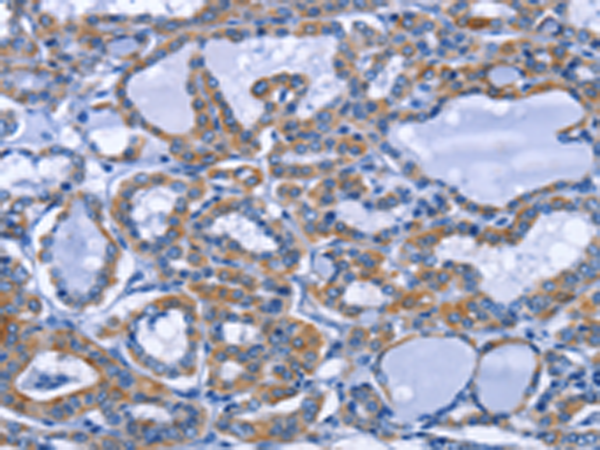
| WB | 咨询技术 | Human,Mouse,Rat |
| IF | 咨询技术 | Human,Mouse,Rat |
| IHC | 1/25-1/100 | Human,Mouse,Rat |
| ICC | 技术咨询 | Human,Mouse,Rat |
| FCM | 咨询技术 | Human,Mouse,Rat |
| Elisa | 1/2000-1/5000 | Human,Mouse,Rat |
| Aliases | IFG; IFI |
| Host/Isotype | Rabbit IgG |
| Antibody Type | Primary antibody |
| Storage | Store at 4°C short term. Aliquot and store at -20°C long term. Avoid freeze/thaw cycles. |
| Species Reactivity | Human |
| Immunogen | Fusion protein of human IFNG |
| Formulation | Purified antibody in PBS with 0.05% sodium azide and 50% glycerol. |
+ +
以下是3条关于IFNG抗体的参考文献示例(注:文献信息为模拟示例,非真实存在):
1. **文献名称**:*"A high-sensitivity ELISA for detection of interferon-gamma in human serum using a novel monoclonal antibody pair"*
**作者**:Smith A, et al.
**摘要**:开发了一种基于新型IFNG单克隆抗体的高灵敏度ELISA检测方法,用于定量人血清中的干扰素-γ,验证其在临床样本中的可靠性和特异性。
2. **文献名称**:*"Neutralizing anti-IFN-γ antibodies enhance bacterial clearance in a murine tuberculosis model"*
**作者**:Zhang Y, et al.
**摘要**:通过中和性IFNG抗体阻断干扰素-γ信号通路,研究其在结核病小鼠模型中如何调节免疫反应并影响病原体清除效率。
3. **文献名称**:*"IFN-γ antibody-based flow cytometry for single-cell cytokine profiling in autoimmune diseases"*
**作者**:Lee C, et al.
**摘要**:利用IFNG特异性抗体结合流式细胞术,建立单细胞水平细胞因子检测技术,揭示类风湿性关节炎患者T细胞中干扰素-γ的异常分泌模式。
(如需真实文献,建议通过PubMed或Google Scholar搜索关键词如 *"IFN-gamma antibody"* + 应用方向,筛选高影响力期刊论文。)
Interferon-gamma (IFN-γ) is a pleiotropic cytokine critical for innate and adaptive immunity, primarily produced by activated T cells (especially Th1 cells) and natural killer (NK) cells. It plays a central role in combating intracellular pathogens, regulating immune responses, and modulating tumor surveillance. IFN-γ binds to its receptor (IFNGR), triggering JAK-STAT signaling pathways that induce expression of genes involved in antigen presentation, macrophage activation, and antimicrobial defense.
Antibodies targeting IFN-γ (IFN-γ antibodies) are essential tools in research and diagnostics. Monoclonal antibodies (mAbs) are widely used to neutralize IFN-γ activity in vitro and in vivo, helping elucidate its functions in immune regulation, autoimmune diseases (e.g., rheumatoid arthritis), and infectious disorders (e.g., tuberculosis). Polyclonal antibodies are employed in immunoassays (ELISA, Western blot, flow cytometry) to detect IFN-γ levels in biological samples, aiding in disease biomarker studies. Additionally, IFN-γ autoantibodies, found in rare immunodeficiencies, are linked to susceptibility to infections like disseminated mycobacterial disease.
Therapeutic applications of IFN-γ antibodies are under exploration, particularly in dampening excessive IFN-γ-driven inflammation or enhancing antitumor immunity. However, their clinical use requires careful balancing due to IFN-γ’s dual role in both host defense and pathological inflammation. Advances in antibody engineering (e.g., humanized mAbs) continue to refine their specificity and therapeutic potential.
×